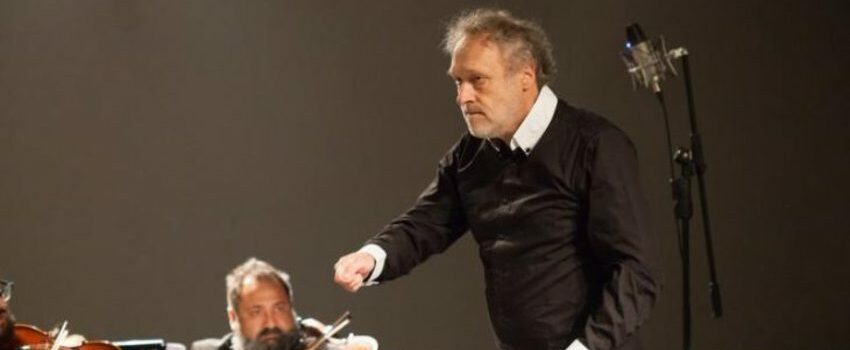- Culture and Extension
ULS Symphony Orchestra seeks to captivate the territory with innovative multimedia concert

'The Creatures of Prometheus' will be the amazing program that the professional group will present at the end of the semester, which will be directed by the energetic and incomparable Nicolas Rauss.
The month of July has been marked by one of the most anticipated astronomical events seen by residents, scientists and tourists. After the total eclipse of the sun visualized in its 100% in the Star Region, the seventh month of the year is preparing to embody a new spectacle for the senses; This is a captivating concert that will revive the feelings of 'Tragedy', through an iconic piece of music written in 1801 by the German genius Ludwig Van Beethoven.
'The Creatures of Prometheus', Op.43, as the masterpiece is titled, was premiered at the Burgtheater in Vienna in that same year and refers to a ballet that Beethoven performed at the request of the Italian choreographer, Salvatore Viganò. In this work, the German composer makes his own the myth of the Titan Prometheus, who, after deceiving the God Zeus, is punished, being chained to the top of a mountain by Hephaestus, God of Fire. After being freed by Heracles, Prometheus sneaks into Olympus, stealing the flame from the Sun God's chariot, returning it to mortals. Broadly speaking, this myth is interpreted as the intellectual enlightenment of human beings. Fire represents the wisdom given to mortals after the darkness caused by the evils of Pandora. Prometheus' heroic act represents the revolution and the salvation of the people.
The score consists of an overture, followed by 16 tables, independent of each other. Of the complete work, only the overture has survived in concert programs and its text, which has now disappeared, has meant constant reinterpretation: “it is very varied music that changes character very quickly. Just as the muses try to sensitize the characters created by Prometheus, through this show we hope to move the senses of the attendees who accompany us on those days," invites the Swiss director, Nicolás Rauss, adding that this piece is "at the height of the Second Symphony, of the First, of the end of the Eroica. It is an absolutely enjoyable work, it has good humor: at times it is funny, pleasant and at times dramatic. It has a very wide range, there are all kinds of atmospheres, there are expressive adages, slow movements, typical even of the most mature Beethoven,” he elaborates.
In the particular case of this piece, the concert includes projections that will contextualize the audience in each of the movements of the work: “What we are going to do is play almost the entire ballet, added to a projection so that the audience can see everything that happens because the music is very descriptive; then, as the music progresses, the audience will find out about the work. It's like going to a kind of musical cinema," reflects the maestro, realizing that 'The Creature of Prometheus' is a work that is not widely known and is about a ballet that Beethoven wrote at the time of his first and second symphonies: “It deals, a little, with the creation of the human being and one realizes that it has a parallel with the creation that was born shortly after with the Bible,” explains the resident director of the Classical Orchestra of the University of Santiago de Chile (Usach).
The fifth trip through emotions will once again reach the communes of Coquimbo and La Serena. The first appointment will take place in the Performing Arts Room of the Palace Cultural Center on Thursday, July 11; while on Friday the 12th it is the turn of La Serena, where the musicians will travel to the Aula Magna of the Ignacio Domeyko Campus of the ULS to repeat this captivating program inspired by feelings of tragedy. Both concerts will be at 20:00 p.m., with no membership fee and no withdrawal of invitations, up to the capacity of the venues.
It should be noted that this season is carried out thanks to the support and financing of the Ministry of Cultures, Arts and Heritage, which since 2016 has been attached to the National Budget Glosa; in addition to the important institutional support provided by the University of La Serena, through the Directorate of Linkage with the Environment and Extension (DIVEULS); the Municipality of La Serena, through its Department of Culture; and the Municipality of Coquimbo in conjunction with its Department of Culture.
Written by Camila Pérez, University of La Serena Symphony Orchestra
